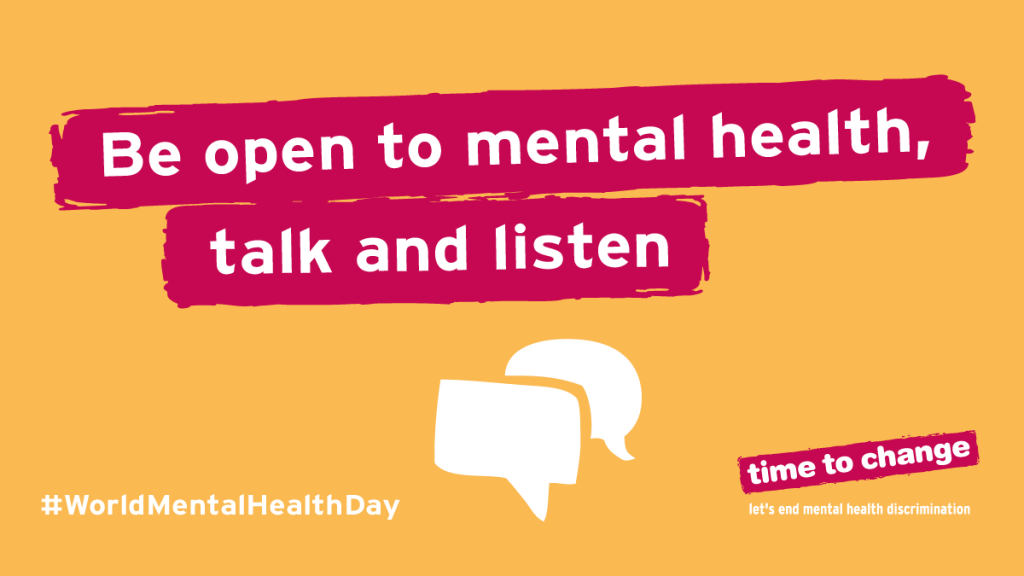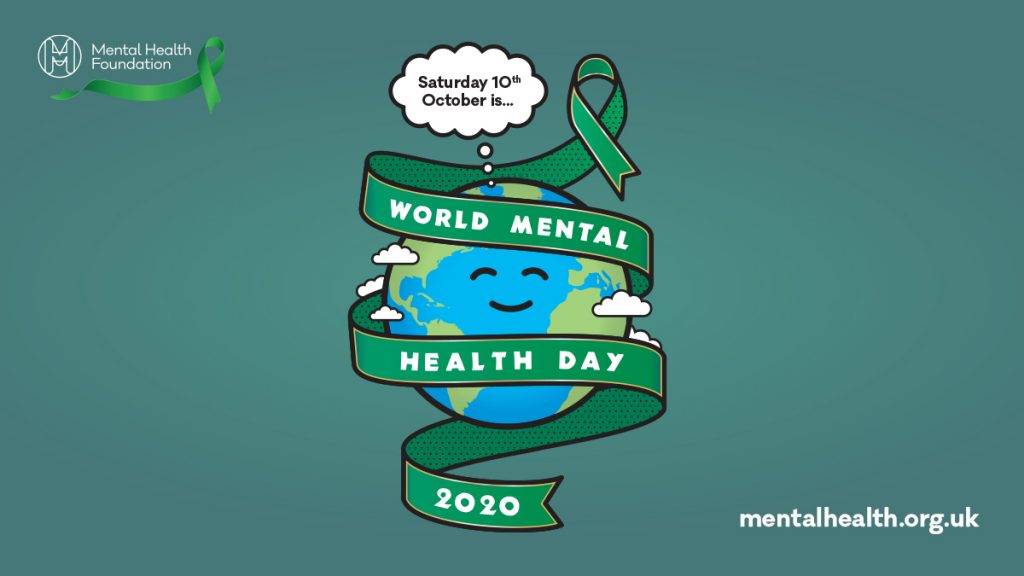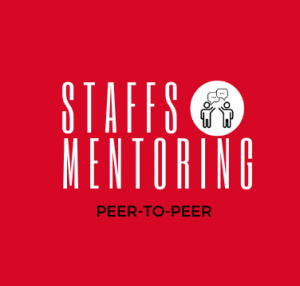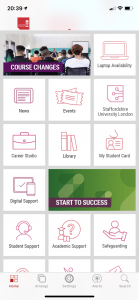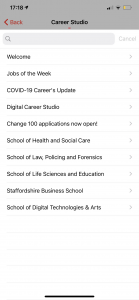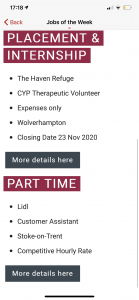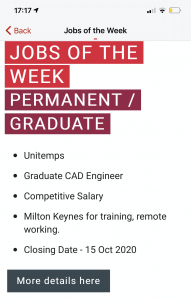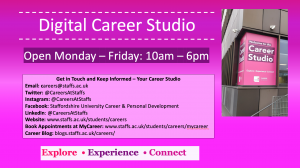How I worked with the Career Studio and the Coaches to secure work experience and graduate employment.
By ,
Written By Matthew, Graduate of 2020 Computer Networks & Security
Introduction
My name is Matthew and I am a graduate of 2020 – Computer Networks and Security at Staffordshire University. I found out about the amazing vital work the Career Studio team do from my course lectures. The university’s academic departments have good links with the Career & Personal Development Team and the Career Relationship Managers/ Coaches who have specialist industry knowledge on tailoring applications and interview advice.
Placement Application Advice
A major part of my university degree was a 12 month industry placement.
The careers service can help prospective placement students with job applications by providing expert CV and Cover Letter advice, alongside tailored interview advice. With most placement students having no previous industry experience it is important to emphasise the content covered on university modules, any qualifications completed and part-time work experience. I would particularly encourage taking part in a university society or volunteering in the community because it shows employers, an individual is motivated and dedicated to a cause without financial enticement.
During my university studies, I have volunteered as an instructor for the local fire service’s cadets programme. This provided me with transferable skills including communication and leadership that I have been able to incorporate in my university modules.
The Benefits of a Placement
All students that are offered the chance to complete a placement as part of their Staffordshire University degree should seize the opportunity for the following reasons:
- Increased employment prospects post-graduation, several students get offered a position at their placement company.
- Improved industry knowledge through interaction with experienced colleagues and exposure to common industry practices.
- Access to university support services such as a dedicated tutor who is available for advice throughout the placement and will visit twice during the contract duration.
- Motivation to improve academic performance in the final year of your degree and utilise skills developed whilst on placement.
- Increased confidence and independence, I experienced this via living on-site during the week and daily meetings to discuss progress on work projects.
Placement Jobs Board and Employment Fair
The initial step for any student looking to complete a placement should be to check the university’s placement jobs board which contains a range of exclusive opportunities that are only open to Staffordshire University students. These roles offer excellent university-approved industry experience and are often at well-established companies such as Cisco, Rolls-Royce and NHS.
My placement was at Ellesmere College, a leading independent school in Shropshire. Students from Staffordshire university have worked at the college for many years and provides amazing benefits including onsite accommodation, all-inclusive meals and opportunity to network with placement students from different disciplines.
Furthermore, the university operates a yearly Connected Futures event for all courses that offer placements and is an excellent opportunity to discuss available roles with employers who will often recruit students they meet. If there are no current opportunities in your desired area it is worthwhile getting their details for future networking. Meanwhile, if it’s part-time employment you are looking for, there is a dedicated fair which offers flexible roles to fit around your studies and overseas adventures in the summer university break – during recent times the events are offered digitally.
Finally, several departments such as Computing offers seminars with industry guest speakers to discuss the latest trends, their current projects and will often advertise roles available within their business. It is important that students take advantage of these opportunities as it promotes good relations between students, companies and the university.
Graduate Services
All Staffordshire University Alumni have lifetime access to careers advice, I will highlight the services I have used below and an insight into my personal job finding techniques.
Tailoring applications based on my Placement
When applying for a graduate job, it is important to emphasise how your university modules and any industry experience make yourself the perfect candidate. In the current crowded job market, I would advise focusing on the desirable qualities in job adverts that indicates how you are a better match than other candidates.
Also, I have seen the importance that employers place on interpersonal skills at a time where many companies are working from home. This makes verbal communication and effective time management stand out. During my placement as an IT support technician, I developed many skills that cannot be obtained during a university course such as processing live cases on task management systems, exposure to industry-standard technologies on a large scale and the chance to interact with multiple departments (internally and externally) to complete a task in line with set deadlines.
The Career Studio has a range of templates for key documents such as cover letters that can be easily adapted to each position without much alteration making it is easier to highlight your key skills in an effective manner.
Graduate Job Interview Preparation
During the many graduate job interviews I attended, most took place in the summer when the country was in lockdown with social distancing in place which meant a majority took place virtually. To help me adapt to this change of interview format, I arranged multiple practice interviews on Microsoft Teams with the university’s careers coaches who were able to test my knowledge of each company and the skills I may require via personal real-life scenarios. Following each interview, I obtained feedback which allowed me to work with the careers team to strengthen my weaknesses. After multiple interviews, I have achieved an IT Analyst position at Knights PLC ( an upcoming nationally-based legal services company, who have their headquarters in Newcastle-Under-Lyme).
Access to careers material post-graduation
There are a range of career’s services that I think are beneficial to graduates including:
- Obtaining LinkedIn Profile Feedback: it is essential to confirm that your profile displays all the information that employers are looking for through the demonstration of previous industry experience. There are now multiple job opportunities exclusive to LinkedIn and 65% of B2B organisations such as Knights PLC have acquired customers via the platform.
- Access to tailored employment content on MyCareer and the links to external training course sites which can develop your knowledge in relation to your existing job or re-skill for a new career path.
- Finally, on a personal note, I would encourage graduate job seekers to target smaller companies, I found this article really interesting:
During my first month at Knights PLC, I have experienced in-depth training demonstrating how legal professionals use company technology. I had the opportunity to meet all my fellow IT technicians including shadowing an experienced colleague for a week. Knights have showcased the dedication to staff retention and success that SMEs can offer which larger companies may struggle with because of staff shortages or business targets which don’t allow for staged introductions. Also, my placement has massively helped because I am familiar with core Windows technologies which most companies will use in various ways with the common aim of providing simple IT systems for user usage.
To speak to one of our Career Coaches get in touch:
Email: careers@staffs.ac.uk
Twitter: @CareersAtStaffs
Instagram: @CareersAtStaffs
Facebook: Staffordshire University Career & Personal Development
LinkedIn: @CareersAtStaffs
Career Chat: https://www.staffs.ac.uk/students/careers/careers-studio/chat-to-our-careers-coaches

